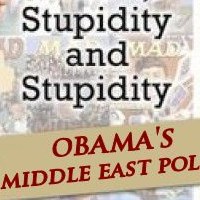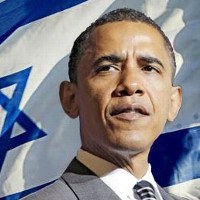![]()
RubinReports | By Barry Rubin
Since there is so much bad policy on the Middle East to critique and since there’s no hope of the Obama Administration listening to alternative strategies, I usually focus on attacking bad policies rather than on suggesting better ones. There is no great mystery, however, about what a good U.S. Middle East policy would look like. You can apply this to any article I write as my constructive answer to the messes, crises, and dangers being faced.
The United States should take leadership. This is what its allies and dependents want and its enemies fear. The UN at times can be a useful instrument but why depend on an organization often dominated by anti-American dictators and totally indifferent to U.S. interests?
Identify the greatest threat today as revolutionary Islamism. Build a broad alliance with all those opposed to revolutionary Islamism. Of course, this list includes millions of non- and anti-Islamist Muslims:
Canada; European allies; Israel; and the remaining Arab governments that are relatively moderate on international affairs: Morocco; Algeria; Saudi Arabia, Kuwait; Bahrain; Oman; the United Arab Emirates; Iraq, South Sudan, and Jordan. Add to that the oppositions in Lebanon, Iran, and Turkey, and the truly moderate elements in Syria. Work with the real moderates and the army in Egypt (though these two are at loggerheads) and Turkey (whose army is being weakened perhaps the point of no return).
Plug in also with India, Azerbaijan, Georgia, and a number of other governments in Asia and Africa, too that face radical external and internal threats. China’s interests should be appealed to based on its desire for stability, need for secure sources of energy and supply routes, and concerns over its own Muslim minority becoming radicalized.
The goal is to keep revolutionary Islamists out of power wherever possible, as was done with Communists in the Cold War. Revolutionary Islamist states and movements should be subverted and weakened. The U.S. government should comprehend that terrorism is a tactic used sometimes by some revolutionary Islamist groups and not a movement in itself. Thus, the very real danger posed by al-Qaida of carrying out terrorist attacks is strategically less significant than the ability of Muslim Brotherhood and other groups of taking over entire countries and turning them against the United States.
The connections between what is today the mainstream interpretation of Islam and revolutionary Islamism should be honestly recognized and U.S. personnel should be given truthful training. The idea that apology, appeasement, or concessions will moderate Islamists should be abandoned. The idea that the West can somehow produce its own moderate brand of Islam or will be rescued by tiny groups of doctrinally moderate Muslims should be dropped.
The direct use of force should be limited to circumstances where it is unavoidable, and it is almost always avoidable, certainly at this point in time. Most of the time the United States can rely on local forces, which have their own interest in stopping revolutionary Islamism. But they must be the right local forces. There is no purpose to be served by maintaining combat troops in Afghanistan, just as is true of Iraq. U.S. policy should use a full arsenal of aid to aligned forces along with economic instruments and covert operations.
Democracy is a nice idea but if it is merely a fig leaf allowing for the creation of new dictatorships what good is it either in strategic terms or even for the people who live in those countries? Pushing for elections no matter what the actual social and political conditions are isn’t a sensible policy, especially because the enemies of real functional democracy (rule of law; fair treatment of minorities, civil liberties) have caught on to the idea of using democratic forms to impose majority-backed dictatorships.
Have no illusion that there is going to be any serious progress on Arab-Israeli or Israel-Palestinian issues. You can keep up a pretense of diplomatic activity but don’t let that get in the way of real priorities. The Palestinian side’s leadership has rejected a two-state solution repeatedly and has no desire for a final end to the conflict.
Iran’s regime is not going to change course or stop seeking nuclear weapons. The answer is not to attack Iran militarily now but to prepare for the day when that might be made necessary by Iran’s own actions. A failure to counter Tehran credibly makes war more likely because that country will become overconfident and overreach. Containing Iran requires combatting the spread of its influence and power in every possible way. As with the USSR, the Iranian challenge goes far beyond the scenario of its launching a nuclear attack.
Recognize that a massive crisis is about to develop as Egypt becomes a radical anti-American, and probably revolutionary Islamist, state. Here, it is probably too late to put into effect a good policy. Instead, the United States must define the red lines that would trigger an aid cut-off or a tough response. In addition, U.S. policymakers should see the army as the principal — but quite inadequate — bulwark there and see the Muslim Brotherhood as the problem and not the solution.
Most important of all do not empower America’s enemies. Not only al-Qaida but also the Muslim Brotherhood, Hamas, Hizballah, Iran, and Syria are foes. The Turkish regime is a more subtle and insidious enemy. Pakistan cannot be trusted and there is no sense pumping billions of dollars into that regime.
A problem here is that recognizing the huge threats and dangers is more disconcerting to the domestic American audience than is pretending that everything is going pretty well, that Obama won the war on terror by getting Usama; that democracy is the answer; that Israel-Palestinian peace is just one Israeli concession away; and that Middle East Muslims now love America because Obama showed that he loves them.
Remember the traditional rules of diplomacy. Strength produces credibility that does more to deter conflict against self-identified foes than does weakness and concessions. You cannot successfully apologize to those who want and need to hate you in order to further their own political agenda and to seize power. If you don’t support your allies you won’t have any.
Much of this is a traditional realpolitik and Realist approach to international affairs. Before the era in which counterproductive and even anti-American views took over U.S. academia, media, and elements of the government, such a strategy would have been taken for granted on a bipartisan basis.
There are many details to be developed in addressing this framework to specific issues but they should arise from these themes. But until there is some basis of reality underlying U.S. policy there is no sense giving detailed advice to those who are not merely mistaken but are headed in the diametrically opposite direction from where they should be going. It all depends on whether the next secretary of state is John Bolton or John Kerry.
Barry Rubin is director of the Global Research in International Affairs (GLORIA) Center and editor of the Middle East Review of International Affairs (MERIA) Journal. His book, “Israel: An Introduction“, has just been published by Yale University Press. Other recent books include “The Israel-Arab Reader” (seventh edition), “The Long War for Freedom: The Arab Struggle for Democracy in the Middle East” (Wiley), and “The Truth About Syria” (Palgrave-Macmillan). The website of the GLORIA Center and of his blog, Rubin Reports. His original articles are published at PJMedia.



 RSS
RSS











[…] power in key countries, through violent revolution or election, it’s no cause for celebration. I discuss the proper alternative policy here which is as “conservative” as Franklin Roosevelt’s strategy in World War Two and Harry […]